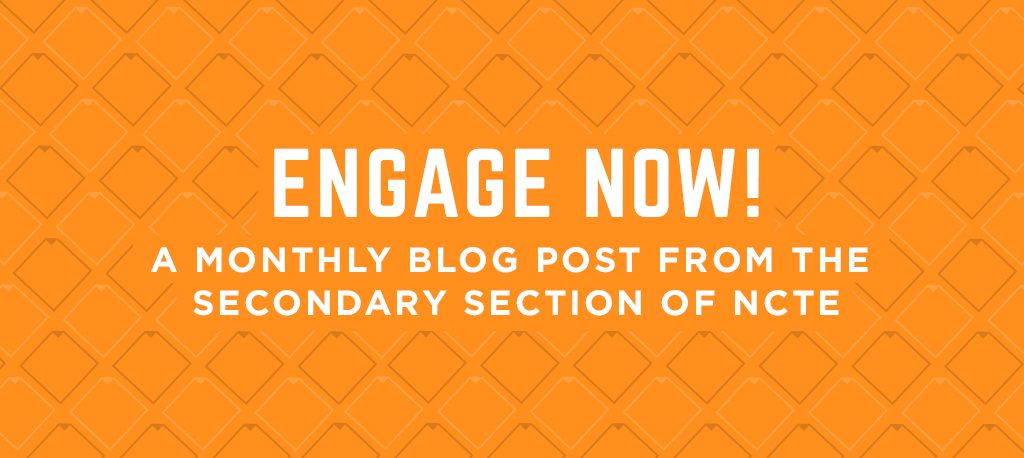From the NCTE Secondary Section Steering Committee
This post was written by NCTE member Josh Thompson, a member of the NCTE Secondary Section Steering Committee.
In May 2020, I purchased a book that changed my life.
I didn’t know it at the time, but I thought the book seemed intriguing. Once it arrived, I let it sit on my coffee table for a few days. We were still in the early stages of quarantine, my school was starting to wrap things up for the tumultuous year, and I just didn’t have the capacity to read one more thing. But when I did finally dive into those pages, my teacher brain was on fire.
That book is Point-Less: An English Teacher’s Guide to More Meaningful Grading by Sarah M. Zerwin (Heinemann, 2020).
Zerwin’s work had answers to questions that I had long been searching for. She writes about her journey to going point-less in her assessment practices. As Cris Tovani explains in the foreword,
Sarah Zerwin has written the book I desperately needed to help my beliefs about learning match my assessment practices. In Point-Less, she nudges teachers to consider how traditional forms of grading get in the way of student growth. Her pioneering ways of marking, collecting, and sharing student work shows teachers how to assess with fidelity and in ways that serve student learning. Instead of assigning random points to student tasks, she demonstrates how teachers can provide students with concise, descriptive data that serves as meaningful and specific feedback.
Like Tovani, I needed this book. I read it cover-to-cover in two days and had pages of notes and annotations. I knew I’d be going point-less in at least some of my classes this school year.
I decided to switch to a point-less system for the fall semester in my yearlong dual enrollment composition classes as well as my dual enrollment British literature survey course. I did so because I assumed that these older students in a higher level course would be able to handle the shift well and that they would be understanding of the inevitable bumps along the way. I could not have been closer to the truth.
As Zerwin explains, overall course grades are determined by student progress on learning goals. I created a list of ten learning goals for each course, a mix of content-based goals and learning behavior goals. I then split the goals into two categories: the ones students can choose from and the ones every student will work on. Of the six goals students can choose from, they select three. Throughout the semester, they monitor their progress on the goals, conduct mid-quarter check-ins, and then write a letter to me at the end of the semester in which they narrate their experience in class and give their self-selected grade with justification.
At first, students needed time to adjust. There was a learning curve. For the entirety of their time in school, they’d never had a teacher who had a point-less grading system. And because they are high-achieving students in dual enrollment classes, they had been so focused on getting the best grades. “How many points is this?” is a common question I had come to expect.
In the beginning of the semester, I reminded students that the only “points” that would go into our online gradebook would be to show completion and thoroughness of their work. I pushed them to focus less on the points and more on their learning and experience in class. After a few weeks, they had a good overall grasp of the system. As the semester progressed, I noticed that students were more willing to take risks; had more to say in class discussions; exhibited greater critical reading, writing, and thinking; and were more engaged than I had experienced in previous classes.
Students who told me in the beginning of the semester that English wasn’t their favorite class, that they never enjoyed reading or writing, that I shouldn’t expect much out of them, were suddenly asking thoughtful questions, participating in class discussions about literature, and revising their writing with fervor.
When I mentioned this to one eleventh-grade student, he responded, “Well, now I know that if I’m completely wrong, it isn’t going to tank my grade. There’s still pressure to get it right, but it’s a different kind of pressure. It makes me want to do stuff for this class.”
After the success with the point-less system in my dual enrollment classes first semester, I decided to implement it in my English 9 Honors class this spring 2021 semester.
Similarly, students have had to adjust to the new way of doing grades, and even though we’ve only been in this semester for about a month, I’m noticing students starting to take risks. They’re thinking about their learning. With the stress of earning points taken away, they’re starting to focus more on their growth. Just last week, a student said to me, “I’ve never thought about it [what I’m learning] like this before. I’m not doing something just to get a grade. I’m actually learning things, not just doing them.”
One 12th grade student’s response in his end-of-semester letter captures the impact of this point-less system: “I developed confidence in this class, which really helped me have the courage to be wrong.”
Given all of the unknowns and suspicions about what this year would bring, I saw Zerwin’s point-less grading system as a way to help students better navigate learning and schooling in a pandemic. It is one of many elements that I intend to continue doing on the other side of all of this.
 An anti-bias, anti-racist educator, Josh Thompson teaches high school English language arts in Blacksburg, Virginia. His passions for daily independent reading, supporting and affirming LGBTQ students, and student-centered learning fuel his practice. You can find him on Twitter @jthompedu.
An anti-bias, anti-racist educator, Josh Thompson teaches high school English language arts in Blacksburg, Virginia. His passions for daily independent reading, supporting and affirming LGBTQ students, and student-centered learning fuel his practice. You can find him on Twitter @jthompedu.
It is the policy of NCTE in all publications, including the Literacy & NCTE blog, to provide a forum for the open discussion of ideas concerning the content and the teaching of English and the language arts. Publicity accorded to any particular point of view does not imply endorsement by the Executive Committee, the Board of Directors, the staff, or the membership at large, except in announcements of policy, where such endorsement is clearly specified.

